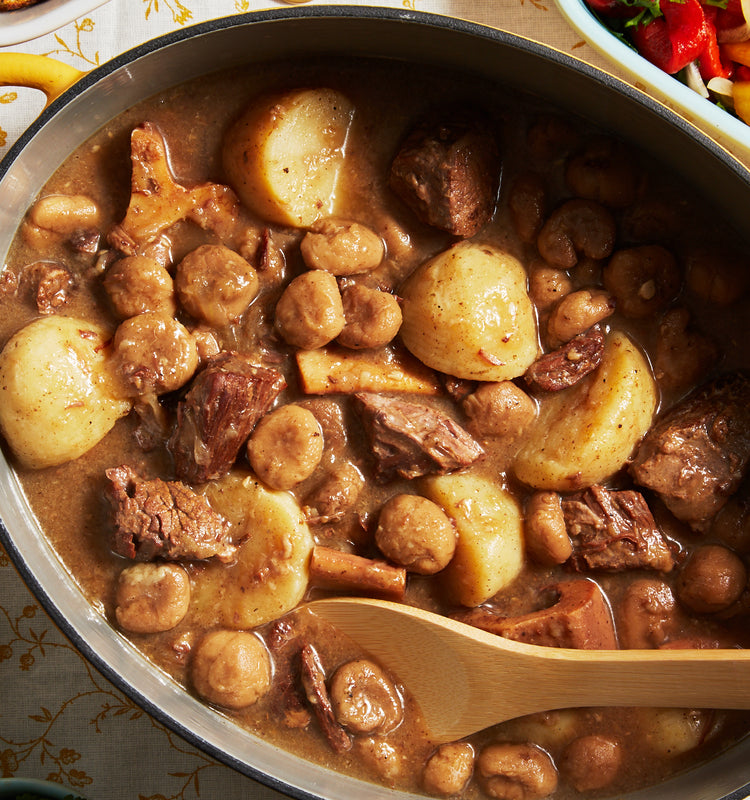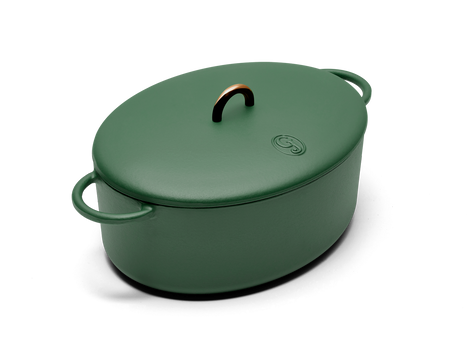Marinate the beef bones and brisket:
Put the beef bones and cubed beef in a large bowl. Add the garlic, vegetable oil, vinegar, and salt and mix and turn the ingredients until all the meat and bones are coated with the marinade. Cover the bowl with plastic wrap and refrigerate for at least 8 hours and up to 24 hours. Preheat the oven to 400°F. Line a baking sheet with parchment paper.
Make the dumplings:
1. In a large bowl, combine the flour, egg, water, and salt and stir until the ingredients come together into a dough. Turn the dough out onto the work surface and knead until smooth, about 5 minutes. Divide the dough into 4 pieces. Lightly flour your work surface and roll each piece into a rope about 1/2 inch (1.25 cm) thick.
2. Cut one rope into 1/2-inch (1.25 cm) pieces. Roll each piece between your palms to form a spherical dumpling, and then poke a dimple into the center with your thumb. As you work, put the shaped dumplings on a plate or tray, keeping them separate so they don’t stick together.
3. Continue with the rest of the dough ropes until all the dumplings are formed. Sprinkle a generous few pinches of flour over the dumplings and toss until they’re all lightly coated with flour, then spread the dumplings on the parchment-lined baking sheet.
4. Bake the dumplings until they are golden brown and crisp, 20 to 30 minutes. Remove from the oven and set aside. Reduce the oven temperature to 220°F.
Cook the dafina:
1. Remove the beef bones and brisket from the marinade (discard the marinade) and pat dry with paper towels. Place The Dutchess over medium-high heat and add 2 tablespoons oil. Once the oil is hot, add the bones and beef to the pot. Sear the meat and bones until nicely browned on all sides, about 15 minutes total, taking care that the pan juices don’t get too dark and burn. Transfer the meat and bones to a bowl.
2. Add about 2 tablespoons water to the pot, stirring and scraping the bottom of the pot to dissolve the pan juices, then simmer for a few seconds, until the liquid has evaporated. Add the onions and garlic and sauté until they are a deep golden brown, 15 to 20 minutes, adjusting the heat if the onions or garlic are getting too dark. Add the cinnamon, cumin, nutmeg, sugar, salt, and pepper and cook for another minute, stirring to distribute the spices.
3. Put the seared meat and bones back into the pot and add the potatoes and eggs. Add enough water to just barely cover the ingredients; it’s fine if the bones are a bit above the water level. Gently stir the mixture to distribute the ingredients and bring the liquid to a boil. Cover the pot with a lid and transfer to the oven. Cook the dafina for 1 hour.
4. Take the pot out of the oven, add the baked dumplings, along with any flour on the baking sheet, and gently stir the mixture. Cover the pot again and return it to the oven. Cook the stew for at least 8 hours longer or overnight. Remove from the oven. Taste the cooking liquid and adjust the seasoning with more salt if needed. Remove the eggs, peel them, and return them to the dafina.
5. To serve, put some beef, potatoes, and dumplings into each serving bowl and then ladle over the cooking liquid. Distribute the eggs and marrow bones to a few lucky diners.
























